

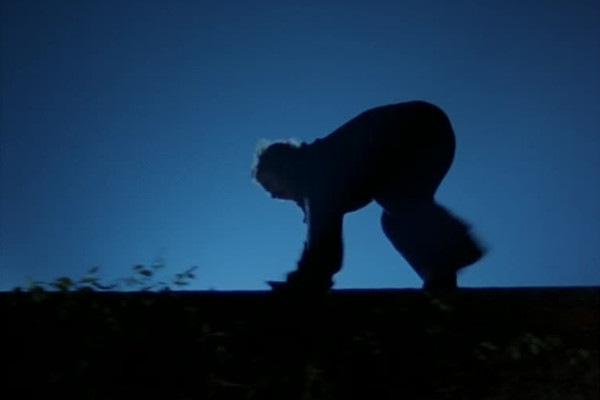
A sign of things to come. Of all the remaining Arthur Conan Doyle stories, someone decided that this would be a better choice than 'The Five Orange Pips' or 'A Case of Identity'?!? Personally, the moment anyone read Watson's line 'Surely Holmes, this is a little far-fetched' in the story, should have sounded alarm bells in the script-editor's mind.
No, no, on they press until they get to the problem of how to depict an eminent elderly professor, injected with monkey glands (stop laughing at the back) running wild in a simian pose. Could a bit of careful editing enable a stuntman to fill in for Charles Kay who has been playing Professor Presbury, No, thinks Tim Sullivan, the director, I'll just have him swing through the trees and then persuade the audience that Charles Kay has been transformed into a gorilla (okay, now you can laugh).
How Brett and Hardwicke keep a straight face is possibly as great a testament to their skill as their triumph in 'The Secret of Sherlock Holmes' was a couple of years previously. It takes quite a talent to make one of ACD's worst stories even more ludicrous, but they managed it with some weird élan here.
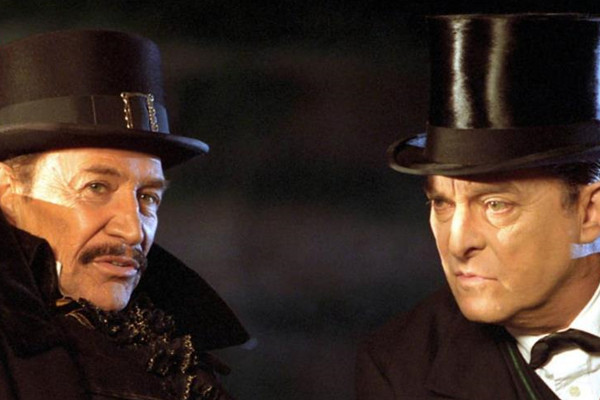
By this stage, Jeremy Brett was so unwell, as a result of the water retention that had swollen his gaunt frame so noticeably in The Casebook, that he fainted on set and had to be hospitalised. Eventually he returned, but he was in a wheelchair and, as soon as filming completed, he was kept in hospital for a month.
The great Sherlock expert, David Stuart Davies, who unexpectedly died himself last year, stated that at this point the final season of Sherlock Holmes was almost cancelled and has given his opinion that it might have been better if it had been. That was undoubtedly true for Brett's health, but one fears that he could not stop by this point and that playing Holmes may well have been the only thing keeping him alive.
The story is too convoluted to distract from the lead actor's clear physical decline and it is not helped by some melodramatic acting on the part of Gary Cady, a typically theatrical turn by Peter Wyngarde and a fairly forgettable villainess from Thunderball's Claudine Auger.
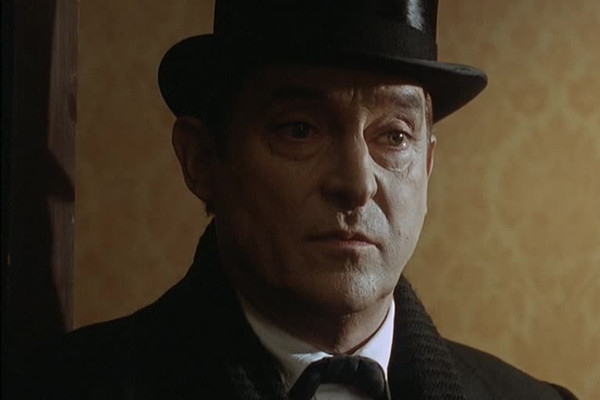
Scriptwriter Jeremy Paul was probably heartily sick of the series by now. After the disasters of the TV films of the previous year, he was now faced with the challenge of making one of Arthur Conan Doyle's dullest stories into an hour of primetime commercial television.
To be fair, he makes a reasonable fist of it, adding a rooftop chase, a fight scene and a lot more for Rosalie Williams's Mrs Hudson to do than usual. But with Brett gravely ill, a lot of the heavy lifting is left for Tom Chadbon's Inspector Hawkins and Hardwicke's Dr Watson to carry out while Brett broods and remains largely helpless in the face of events.
But then Paul has Holmes shedding tears in the final scene. Why? This smacks of a desperate attempt to keep the character interesting by going against everything that we knew about him (much as Eric Saward did with the character of the Doctor during Colin Baker's disastrous tenure), as well as exploiting the lead actor's illness. I cannot believe that Brett would have permitted such a scene even three years earlier.
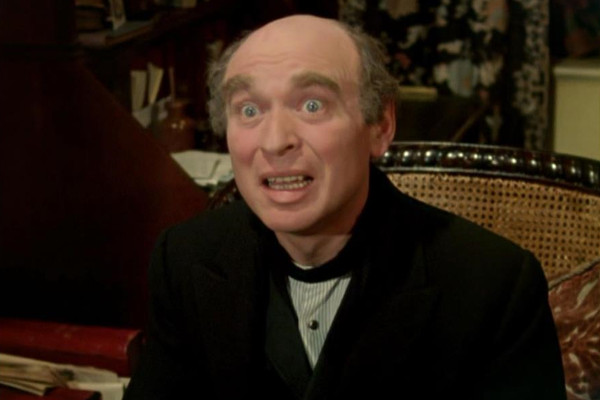
I know. The beloved 'Blue Carbuncle', this low on the list? But... it's Christmas! Well, for a start, this episode was first aired in June, so any associations with festive telly are entirely of your own devising. Secondly, it is fairly obvious from the start that the only recognisable guest star, Ken Campbell, did it (in much the same way that it is fairly obvious in ACD's original story). Thirdly Campbell overplays it terribly, acting like he's in panto - all funny walks and overactive eyebrows – you can see Brett trying to suppress a guffaw at times. Fourthly, there is a rather over-drawn sentimental portrayal of the falsely accused, Horner, and his family that recalls Dickens at his most mawkish. Fifthly, there is a very laboured and over-acted prologue in which David Carson depicts the bloody history of the eponymous jewel by setting the action inside the carbuncle. Finally, there is some of the most treacly Christmas music that one could ever hear, ALL THE BLOODY WAY THROUGH. Only the wonderful Frank Middlemas and Brett and Burke's examination of the hat make this worth sticking with.
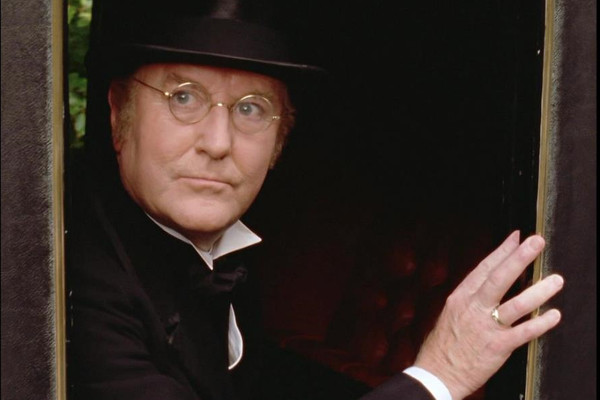
Was there ever such an indicator that, no matter how bad the film or series, there would be something to enjoy once Robert Hardy's name appeared on the credits? He emerged from the unending Harry Potter films, the risible Cleopatras and even the interminable All Creatures Great and Small with his reputation intact, but also left us his unmatchable Winston Churchill, his ridiculous Mr Brooke from Middlemarch (1994) and my favourite of them all, his bullying yet terrified Pontious Pilate in Dennis Potter's astonishing Son of Man (1969).
Here Hardy is by far the best thing in the only watchable of the three 'TV movies' that Granada insisted that June Wyndham-Davies produced between The Case-Book and The Memoirs. Michael Cox had finally had enough when he was asked, as he puts it, to reconstruct the Niagara from a drop of water – to turn ACD's ten page 'Charles Augustus Milverton' into a two-hour thriller, the format of Central's hit Inspector Morse which Granada were desperate to emulate. Jeremy Paul manages to pastiche ACD remarkably well and Robert Hardy is such a consummate TV actor, that you barely notice the padding. At least on first viewing.
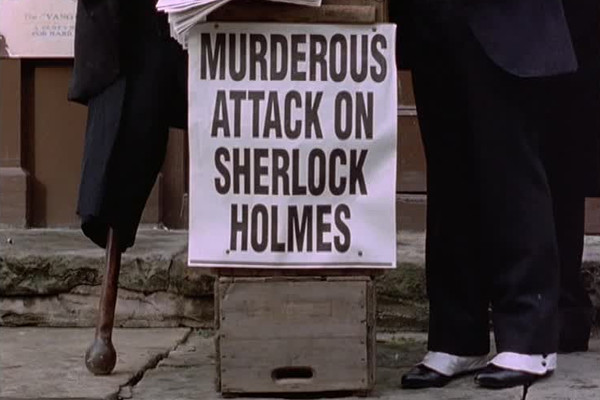
The problem with this episode is that it isn't really a Sherlock Holmes story. As with so many of the weaker stories, Arthur Conan Doyle has inserted the pair into a different genre: It is a revenge tragedy with Holmes and Watson as unlikely protectors of women's virtue. If it had been published under Wilkie Collins's name, it would have been accepted as genuine and even Thomas Hardy would have enjoyed writing the tale of Baron Gruner as it contains all his usual cheery plot elements – the mistreatment of women, a callous and powerful man, fate returning unexpectedly and even a bit of violence.
Raffles himself, Antony Valentine, plays the role with the same Germanic accent and sadistic streak he first perfected in Colditz twenty years previously, but with a more faded glamour that hints at debauchery and excess. The score by Patrick Gowers is one of his best, but ultimately this is a rather grubby affair that Holmes should really have handed over to Lestrade.
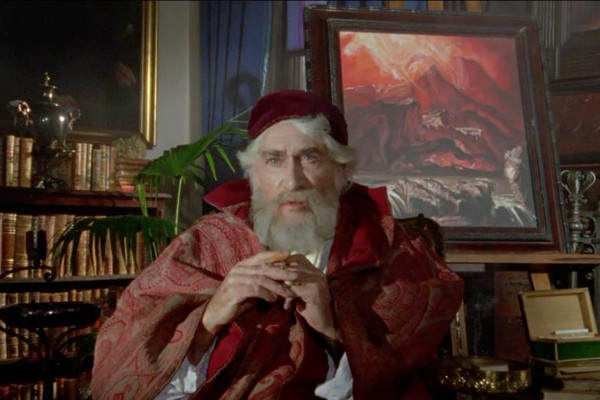
Considering the total pig's breakfast he was about to make with 'The Mazarin Stone', director Peter Hammond manages a reasonably creditable job here. He manages to include an image of the titular pince-nez with a shattered lens and Tsarist forces firing on unarmed civilians, which is an obvious call-back to Eisenstein's Battleship Potemkin, as well as a shot of Frank Finlay's 'Professor Coram' being wheeled around his estate which references Citizen Kane.
And scriptwriter Gary Hopkins takes the opportunity of the politics in Arthur Conan Doyle's original story to add a red-herring subplot depicting the suffragette cause, although he is unable to overcome to ludicrous nature of ACD's resolution, involving secret doors and a poisoned wife.
Knowing that the series was reaching its apotheosis, Edward Hardwicke had been unable to resist the offer of a role in Peter Medak's Let Him Have It, so this episode has no Watson, with Charles Gray preparing for having to fill in for Holmes later in The Memoirs, bizarrely filling in for the good doctor here.
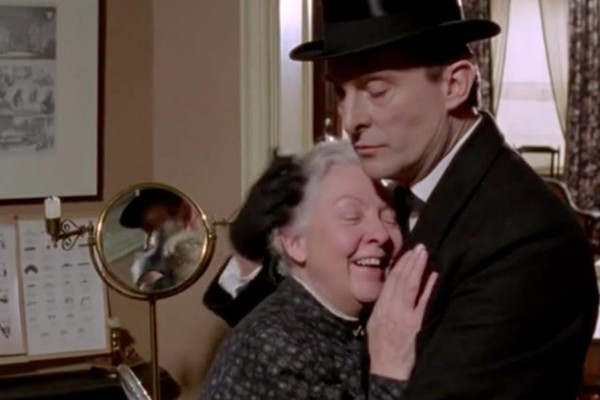
This is where the series does turn into a bit of a soap opera – and where the temptation for it to remain so completely derailed the promising revival in 2010. It's lovely to see a (strangely altered) Watson flabbergasted by the return of his old friend from beyond the grave and it must be noted that Rosalie Williams, as the redoubtable Mrs Hudson, gets the chance to do more than tut and look disapprovingly at her tenants' antics for once and rises to the challenge with aplomb.
But there is no real story, just a colossal bit of retconning that contradicts what we saw with our own eyes less than a year earlier and rather betrays the drama that of 'The Final Problem'. Patrick Allen brings the same class to the story that he brought to Barratt Homes but thankfully, James Bree, playing the coroner, doesn't try to put on a similarly bizarre accent as he did as the War Chief in 'The War Games' in Doctor Who in 1969. Essential, but forgettable.
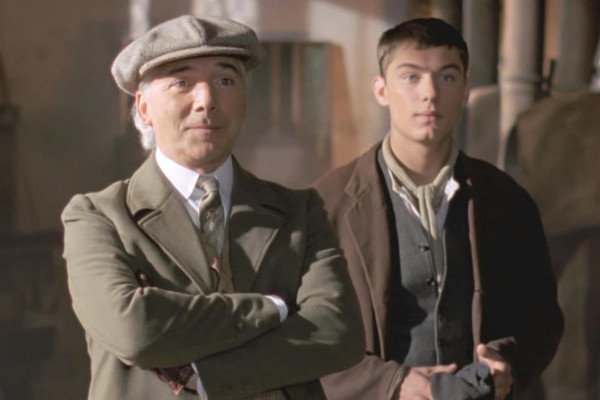
Yes, this is the one with Jude Law in a very minor role. Personally, I'm glad he is given as small a part as possible, as I think he may well be the most over-rated actor that Britain has produced since Laurence Olivier. How anyone makes a career out of looking down his nose and sticking his chin out the way Mr Law does quite baffles me.
Like Olivier, his reputation is based on his glamour and his ability to court the media but does nothing to overcome such travesties as the remake of Alfie and his terrible turn as Watson in Guy Ritchie's appalling Sherlock Holmes films, not to mention his horribly ill-judged 'International Day of Peace' campaign, which has not exactly proved to have had any effect other than boosting Mr Law's profile yet further.
Why am I so distracted from the story to have a go at Jude Law? Well, because this is a fairly pedestrian affair, with some pretty undistinguished performances (apart from the marvellous regulars, of course), a staggeringly obvious 'mystery' that it takes Holmes far too long to uncover, with unnecessarily 'spooky' scenes in the crypt that, in retrospect, make no sense at all.